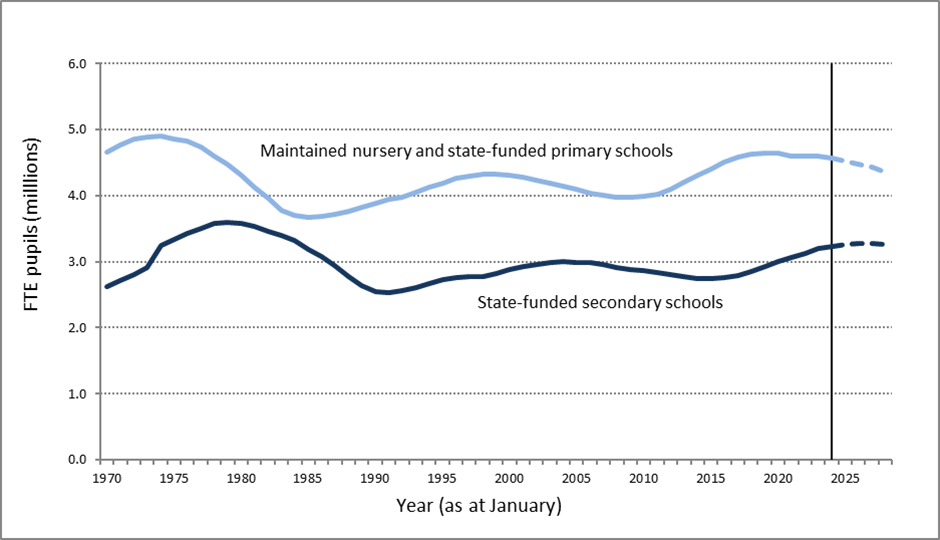Falling pupil numbers
Urban areas across the United Kingdom are facing a significant decline in the number of pupils.
Research by the National Foundation for Educational Research reveals that state primary schools in London have experienced a 6.8% drop in roles between the academic years 2017/18 and 2023/24. While this trend is hitting primary schools the hardest, as cohorts of students grow older, it will no doubt affect secondary schools too.
The main driver behind this decline is falling birth rates. However, fewer students mean less funding due to the Department for Education’s (DfE) per-pupil funding system which allocates funding to schools per person. Despite reduced funding, schools will have the same physical area to maintain which could fall into disrepair.
The long-term impact on social and environmental sustainability dimensions is concerning. Schools support not just a cohort of children but also families and whole communities. As these spaces become ill-maintained and underutilised, they may be less able to provide support. At the same time, underutilised real estate can be harmful to the environment, with excess space still consuming heat and light energy, burning precious finite resources.
Why does this matter for real estate?
A decline in school roles has prompted built environment professionals to rethink how schools are designed and utilised. Some schools are being integrated into mixed-use developments. A notable example is Hackney New Primary School, designed by Henley Halebrown, which incorporates 68 affordable housing units alongside retail space. Some existing schools are being forced to merge, leaving one unlucky school to be closed down and potentially sold for redevelopment.

Source: Gov.UK
While this might seem like a logical response to declining pupil numbers, it may not be rational in the long term. Historically, dips in student roles have been temporary, followed by periods of growth. The danger of selling off school land now is that it may be difficult to repurchase land when pupil roles recover. Schools of the future could find themselves struggling to find appropriate land, a challenge that surfaced during previous demographic changes in pupil numbers (Figure 1).
Co-working spaces and their benefits
While schools are grappling with fewer students, another trend is on the rise: co-working spaces. These spaces have become popular among freelancers, entrepreneurs, and small-to-medium-sized enterprises providing flexibility to workers. Co-working spaces tap into a shared economy model which can address underutilisation.
There is growing interest in how co-working spaces could be incorporated into educational buildings such as universities. Public-private partnerships between the various types of state schools and co-working space providers could transform schools into intergenerational hubs.
These partnerships benefit both children and adults. For cohorts of children, it could enhance visibility of various job sectors, whereas parents who may work in these spaces and have children in the school could benefit in terms of their childcare duties. Furthermore, this strategy ensures school spaces are used efficiently rather than being left empty. Instead of selling off land, social leases to co-working providers would also protect school buildings and allow for future pupil roles to recover while generating an income to maintain them.
Barriers to implementation
In schools awaiting development, contracts between co-working providers and schools already exist successfully. However, the integration of co-working spaces in operating schools is not without its challenges.
One challenge is digital infrastructure in schools. Many schools still struggle with outdated or poorly implemented Wi-Fi and digital systems, which is essential in supporting the needs of co-working professionals. However, my own research suggests that urban schools typically have better digital infrastructure, with one school professional commenting that their broadband was “better than you’d find in any office.”
Perhaps the most significant challenge is ensuring compliance with school safeguarding measures. The safety of students must remain the top priority. Current safeguarding protocols require adults entering school premises to be either accompanied by staff or have passed a disclosure and barring service check. Schools would need to carefully consider which areas of the school could be occupied by co-workers, ensuring there is no overlap with sensitive areas of the school. This may require reconsideration of entrance routes from car parks, investment in school access control systems or architectural interventions through zoning.
Final word
As pupil numbers continue to fall, the pressure to find creative solutions for underutilised school spaces is mounting. The effect of the introduction of Labour’s VAT on private schools on state pupil numbers remains to be seen, nevertheless, closing primary school buildings is a reality.
Repurposing parts of schools for co-working spaces offers a more flexible approach than simply selling off land, while also harnessing the potential to deliver a range of environmental, social, and economic benefits.




